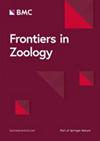Rediscovering the unusual, solitary bryozoan Monobryozoon ambulans Remane, 1936: first molecular and new morphological data clarify its phylogenetic position
IF 2.6
2区 生物学
Q1 ZOOLOGY
引用次数: 0
Abstract
One of the most peculiar groups of the mostly colonial phylum Bryozoa is the taxon Monobryozoon, whose name already implies non-colonial members of the phylum. Its peculiarity and highly unusual lifestyle as a meiobenthic clade living on sand grains has fascinated many biologists. In particular its systematic relationship to other bryozoans remains a mystery. Despite numerous searches for M. ambulans in its type locality Helgoland, a locality with a long-lasting marine station and tradition of numerous courses and workshops, it has never been reencountered until today. Here we report the first observations of this almost mythical species, Monobryozoon ambulans. For the first time since 1938, we present new modern, morphological analyses of this species as well as the first ever molecular data. Our detailed morphological analysis confirms most previous descriptions, but also ascertains the presence of special ambulatory polymorphic zooids. We consider these as bud anlagen that ultimately consecutively separate from the animal rendering it pseudo-colonial. The remaining morphological data show strong ties to alcyonidioidean ctenostome bryozoans. Our morphological data is in accordance with the phylogenomic analysis, which clusters it with species of Alcyonidium as a sister group to multiporate ctenostomes. Divergence time estimation and ancestral state reconstruction recover the solitary state of M. ambulans as a derived character that probably evolved in the Late Cretaceous. In this study, we also provide the entire mitogenome of M. ambulans, which—despite the momentary lack of comparable data—provides important data of a unique and rare species for comparative aspects in the future. We were able to provide first sequence data and modern morphological data for the unique bryozoan, M. ambulans, which are both supporting an alcyonidioidean relationship within ctenostome bryozoans.重新发现不寻常的单生贝类 Monobryozoon ambulans Remane, 1936:首次分子和新形态学数据澄清了其系统发育位置
在大多为群居动物的环节动物门(Bryozoa)中,最奇特的类群之一是单栉水母类(Monobryozoon)。作为一个生活在沙粒上的小型底栖类群,它的奇特性和极不寻常的生活方式令许多生物学家着迷。特别是它与其他贝类的系统关系仍然是一个谜。尽管在其模式产地赫尔戈兰(Helgoland)进行了无数次搜寻,但直到今天,人们仍未再次遇见过这种生物。在此,我们报告了对这一几乎是神话般的物种--伏牛单栉水母(Monobryozoon ambulans)的首次观察结果。自 1938 年以来,我们首次对该物种进行了新的现代形态分析,并首次提供了分子数据。我们的详细形态分析证实了之前的大部分描述,同时也确定了特殊的伏地多态动物的存在。我们将这些动物视为芽状原体,它们最终会连续地与动物分离,使其成为假殖动物。其余的形态学数据表明,它与栉水母纲的栉水母类有密切联系。我们的形态学数据与系统发生组学分析结果一致,系统发生组学分析结果将其与栉水母类(Alcyonidium)聚类为多甲栉水母类的姊妹类群。通过对分化时间的估计和祖先状态的重建,我们发现伏龙鱼的单生状态是一种衍生特征,很可能是在晚白垩世演化而来的。在这项研究中,我们还提供了伏地龙的整个有丝分裂基因组,尽管目前还缺乏可比数据,但这为未来的比较研究提供了一个独特稀有物种的重要数据。我们首次提供了独特的伏龙贝的序列数据和现代形态学数据,这两个数据都支持了栉水母纲贝类中的栉水母纲关系。
本文章由计算机程序翻译,如有差异,请以英文原文为准。
求助全文
约1分钟内获得全文
求助全文
来源期刊

Frontiers in Zoology
ZOOLOGY-
CiteScore
4.90
自引率
0.00%
发文量
29
审稿时长
>12 weeks
期刊介绍:
Frontiers in Zoology is an open access, peer-reviewed online journal publishing high quality research articles and reviews on all aspects of animal life.
As a biological discipline, zoology has one of the longest histories. Today it occasionally appears as though, due to the rapid expansion of life sciences, zoology has been replaced by more or less independent sub-disciplines amongst which exchange is often sparse. However, the recent advance of molecular methodology into "classical" fields of biology, and the development of theories that can explain phenomena on different levels of organisation, has led to a re-integration of zoological disciplines promoting a broader than usual approach to zoological questions. Zoology has re-emerged as an integrative discipline encompassing the most diverse aspects of animal life, from the level of the gene to the level of the ecosystem.
Frontiers in Zoology is the first open access journal focusing on zoology as a whole. It aims to represent and re-unite the various disciplines that look at animal life from different perspectives and at providing the basis for a comprehensive understanding of zoological phenomena on all levels of analysis. Frontiers in Zoology provides a unique opportunity to publish high quality research and reviews on zoological issues that will be internationally accessible to any reader at no cost.
The journal was initiated and is supported by the Deutsche Zoologische Gesellschaft, one of the largest national zoological societies with more than a century-long tradition in promoting high-level zoological research.
 求助内容:
求助内容: 应助结果提醒方式:
应助结果提醒方式:


